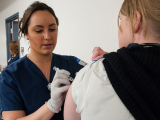Nov 14, 2006 (CIDRAP News) – Adults may have a slightly higher risk for hospitalization with Guillain-Barré syndrome (GBS) within a few weeks after influenza vaccination than at other times, though their overall risk of the disorder remains very low, Canadian researchers reported yesterday.
Researchers from the University of Toronto, who published their findings in the Nov 13 issue of Archives of Internal Medicine, studied residents of Ontario, where everyone older than 6 months can receive a free annual flu shot under a program that began in 2000.
GBS, believed to be an autoimmune disorder, causes weakness or tingling that can worsen to paralysis. The syndrome affects roughly 1 in 100,000 people each year. Some previous studies have linked flu vaccination with a slightly increased risk of GBS, but uncertainty remains about the association.
The researchers performed two analyses. In the first, they identified all hospitalizations for GBS among Ontario residents aged 18 and older from April 1993 through March 2004. Then they identified which patients received flu shots and compared their risk for hospitalization for GBS for two time intervals: 2 to 7 weeks and 20 to 43 weeks after vaccination.
In a second analysis, the researchers examined the number of hospitalizations for GBS in Ontario between 1991 and 2004 and compared the number of cases before and after the universal flu immunization program began in 2000.
The results of the first analysis revealed there were 1,601 hospitalizations for GBS between 1993 and 2004, 269 of which occurred within 43 weeks after the patient received a vaccine, presumably for influenza, in October or November. Patients were 1.45 times as likely to be hospitalized for GBS from 2 to 7 weeks after vaccination as they were between 20 and 43 weeks after vaccination.
In the second analysis, the authors identified 2,173 hospitalizations for GBS between 1991 and 2004 and found no significant difference between hospitalization rates before and after the universal immunization program took effect.
The authors say the study results should be interpreted carefully. “The increase in relative risk we observed corresponds to a very low absolute risk for Guillain-Barré syndrome, given the low baseline incidence of the disease (approximately 1 in 100,000 population),” they write. “Furthermore, the lack of association on a population level is consistent with the assumption that the influenza vaccine is one of many potential causes of GBS."
They also note that the US Institute of Medicine in 2003 reviewed studies from the preceding 26 years and concluded there was inadequate evidence to either confirm or reject a link between flu immunization and GBS.
A recent study of the safety of the influenza vaccine in thousands of children aged 6 to 23 months found only two instances of GBS, and neither of the patients was diagnosed with the condition within a few weeks after vaccination.
However, the authors of the new study say that people who receive flu shots should be advised of the potential risk for GBS and that active surveillance should be included in any mass vaccination program for pandemic flu.
Dr. Julie Gerberding, director of the US Centers for Disease Control and Prevention (CDC), was asked about the Canadian study at a press update on flu vaccination yesterday. She said the study is consistent with other research findings that have shown people who get the flu vaccine have a negligible risk of developing GBS.
Gerberding said the study has not prompted the CDC to change its recommendations about flu vaccination, and added that the health risks related to flu far outweigh any risk of developing GBS from the vaccine.
Juurlink DN, Stukel TA, Kwong J, et al. Guillain-Barré syndrome after influenza vaccination in adults: a population-based study. Arch Intern Med 2006;166(20):2217-21 [Abstract]
See also:
Oct 25 CIDRAP News article “Study shows flu shots safe for 6- to 23-month-olds”




















